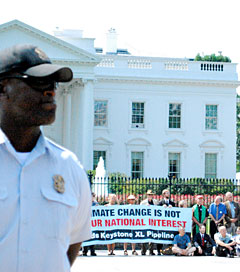Did you know that Truthout is a nonprofit and independently funded by readers like you? If you value what we do, please support our work with a donation.
The key political fact about the proposed Keystone XL tar sands oil pipeline from Canada to the Gulf of Mexico is this: at the end of the day, the decision of whether to approve the permit for the pipeline or not will be a political decision wholly owned by President Obama.
The final determination on the permit will be based on whether approval would be in the “national interest” of the United States. This is an inherently political determination. By denying the permit for the pipeline, President Obama can take a concrete action against climate chaos without securing one Republican vote, without spending one tax dollar, without getting approval from the Tea Party.
If, on the other hand, President Obama were to approve the permit for the pipeline, then he would be acting to promote climate chaos, and this decision could not be blamed on the dispute over the nation's projected debt in 2021, Republicans or the Tea Party. It would be President Obama, standing alone, breaking a campaign promise to act to protect the climate from chaos induced by human action.
This is a global justice issue, because climate chaos is inherently discriminatory against the poor and the weak. A hurricane that strikes Haiti and Florida with the same force is virtually guaranteed to hurt Haitians more, because Haiti has fewer resources to protect its citizens against hurricanes. More Haitians have inadequate shelter to start with; the infrastructure for emergency response is weaker; the health care system is weaker. So, any action that has the effect of making hurricanes more intense is going to have disparate impacts on Florida and Haiti, for the future, as far as we can see.
The Intergovernmental Panel on Climate Change has noted:
Globally, estimates of the potential destructiveness of hurricanes show a substantial upward trend since the mid-1970s, with a trend towards longer storm duration and greater storm intensity, and the activity is strongly correlated with tropical sea surface temperature.
Actions taken by the United States that promote climate chaos are fundamentally unjust – and also economically inefficient – because of the fact that significant costs from such actions will be “externalized” – felt outside the United States.
It is beyond reasonable dispute that actions that contribute to the exploitation of the Alberta tar sands will contribute to climate chaos. As The New York Times noted in an editorial last week urging President Obama to reject the pipeline, this has been documented by Canada's environment ministry.
The counter-argument made by the State Department in its environmental assessment made public Friday is that this concern isn't relevant, because no matter what the United States does, Canada will fully exploit the tar sands anyway:
At the heart of the Obama administration's arguments is the contention that Canada will expand strip mining and drilling for the very thick oil in Alberta whether or not the Keystone XL pipeline to the Gulf Coast gets built.
But this dispute simply points back to the fact that at the end of the day, it's a political determination. To say that Canada is going to do whatever it's going to do, regardless of what the United States does, is one way of looking at it.
The other way of looking at it is this: the political struggle in Canada over the exploitation of the tar sands is fully joined. A proposed pipeline to the Pacific through British Columbia is hotly contested. Some Canadians want to exploit the tar sands to the maximum possible; other Canadians strongly oppose this. Because of the permit application, the United States cannot avoid taking sides in this dispute. If he were to approve the permit, President Obama would be taking sides with the Canadians who want to exploit the tar sands to the maximum and standing against those Canadians who strongly oppose doing so.
If you want to take sides in the dispute over whether President Obama should approve the permit for the pipeline, you can do that here.
A terrifying moment. We appeal for your support.
In the last weeks, we have witnessed an authoritarian assault on communities in Minnesota and across the nation.
The need for truthful, grassroots reporting is urgent at this cataclysmic historical moment. Yet, Trump-aligned billionaires and other allies have taken over many legacy media outlets — the culmination of a decades-long campaign to place control of the narrative into the hands of the political right.
We refuse to let Trump’s blatant propaganda machine go unchecked. Untethered to corporate ownership or advertisers, Truthout remains fearless in our reporting and our determination to use journalism as a tool for justice.
But we need your help just to fund our basic expenses. Over 80 percent of Truthout’s funding comes from small individual donations from our community of readers, and over a third of our total budget is supported by recurring monthly donors.
Truthout has launched a fundraiser, and we have a goal to add 231 new monthly donors in the next 48 hours. Whether you can make a small monthly donation or a larger one-time gift, Truthout only works with your support.
